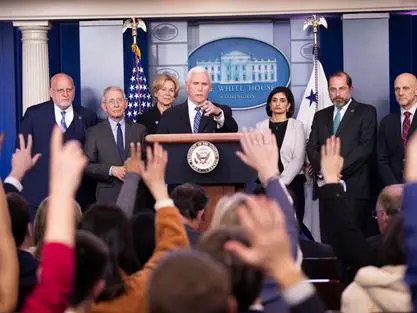The novel coronavirus is spreading into more countries. As the window of opportunity to stop it from becoming a pandemic is closing up, it is time to hold hands.
But some in the United States seem to disagree. Instead of joining the global fight, they are busy looking for someone to blame. China, unsurprisingly, became their primary target, in a renewed chapter of their long-running China-bashing game.
Over the weekend, U.S. Senator for Florida Marco Rubio blamed China for "putting the world at risk," and attacked Beijing for lacking transparency and "necessary precautions at the onset of the outbreak."
Other Washington politicians like U.S. Secretary of State Mike Pompeo and White House trade advisor Peter Navarro have also kept their China-smearing machines humming.
Those China-bashers should be reminded that finding fault with China does not help slow down the spread of the virus or cure struggling patients. Only forceful actions and robust international cooperation can.
Since the outbreak of the epidemic, the Chinese government has acted in a rigorous, transparent and responsible manner to battle the deadly disease. So far, it has achieved steady and conspicuous headway in putting the epidemic under control. As a result, nations of the world have the chance to get better prepared.
Beijing is also working to resume domestic work and production in a meticulously managed manner so as not to risk a reversal in the anti-epidemic fight, and to mitigate possible impact on the global supply chains.
China's measures may not be entirely suitable for others as different countries are facing different situations, yet they do offer some useful reminders for decision-makers, medical professionals and ordinary people worldwide who are also battling the disease.
Virus respects no borders. And it has been a global battle since the very start of the outbreak in this era of growing global interconnectivity. That makes international cooperation highly significant. Washington's fearmongers can only sow divisions and mistrust, and stoke hatred.
To win this fight, nations of the world have at the moment three common priorities.
One is to continue keeping each other updated on every useful piece of information, including the latest virological research results, infection numbers and vaccine developments; the second one is to jointly throttle, or at least slow down, the cross-border spread of the disease; the third is to resist the temptation of beggar-thy-neighbor policies.
Over the long run, members of the international community need to work together to close the gaps in the existing global health security cooperation mechanism so as to better cope with similar challenges in the future.
They should also get ready to rein in the knock-on effects of the epidemic on the global economy, and coordinate more closely to prevent anti-globalization sentiments from triggering a global recession. The recent roller-coaster rides in the stock markets worldwide have flashed a warning sign.
Richard Partington, an economics correspondent with the British newspaper the Guardian, admitted in his recent article that globalization makes "the spread of viral disease easier and incubate many other social and economic ills," but he also warned that "lurching headlong into a protectionist and luddite world will not provide adequate and lasting solutions."
As the clock ticks relentlessly away, the war on the disease rages on. Precious time should be spent on growing consensus and pooling strength globally rather than wantonly pointing fingers at others. That is the only way out.
(by Xinhua writer Jiang Li)
 简体中文
简体中文







